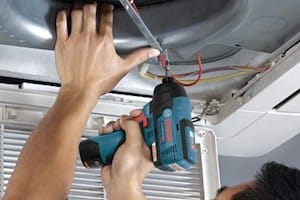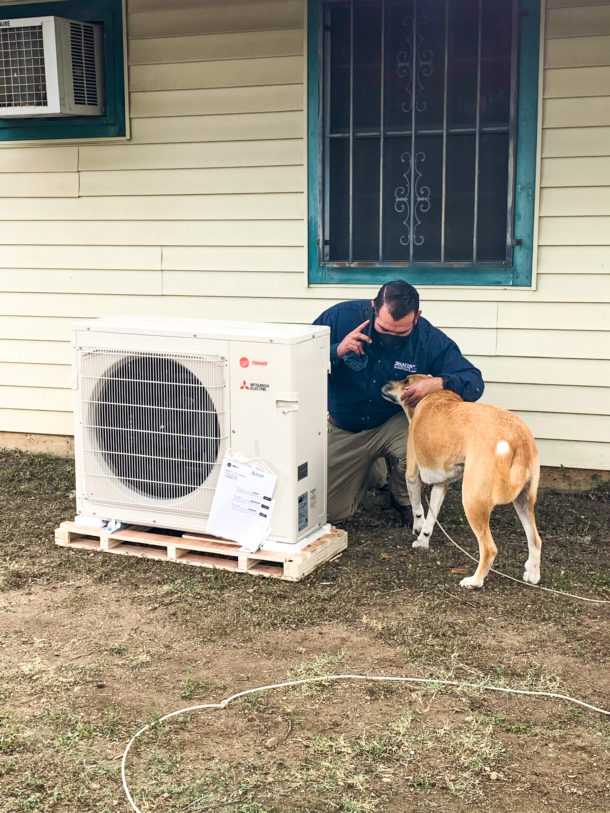HVAC technicians or contractors are well-trained professionals who are experts in everything HVAC. They are well versed in every component inside the HVAC system. Besides, for HVAC repair or maintenance tasks, they follow the proper guidelines and handle the HVAC unit very cautiously. But should you consider hiring an HVAC contractor or do DIY for Read more
DIY

HVAC technicians or contractors are well-trained professionals who are experts in everything HVAC. They are well versed in every component inside the HVAC system. Besides, for HVAC repair or maintenance tasks, they follow the proper guidelines and handle the HVAC unit very cautiously.
But should you consider hiring an HVAC contractor or do DIY for HVAC repairs?

1. Follows Strict Protocols During HVAC Cleaning
HVAC systems are complicated and need to be handled cautiously. When you hire a novice HVAC technician or handyman who doesn’t have enough experience handling an HVAC unit, he will likely damage the HVAC system. On the flip side, when you hire an expert HVAC contractor, he strictly follows the HVAC cleaning protocols.
For example, for cleaning the outside AC unit, an experienced HVAC contractor will first disconnect the cooling system. Then if there is debris in the cooling unit, he will clean them. After that, he will clean the AC fins and coils. When the HVAC contractor cleans the AC fins and coils, he will straighten the AC fins and level the HVAC unit. Similarly, there are protocols for cleaning the parts inside the AC unit.
When the protocols are followed strictly, there is zero risk of damaging your HVAC unit. But a person who doesn’t have experience in handling HVAC systems doesn’t know this HVAC cleaning protocol. As a result, if that person tries to clean the HVAC system, it can cause severe damage to the HVAC system. This is why for HVAC cleaning, you should never DIY. Instead, it is advised to hire an HVAC contractor to clean the unit.
2. Fast & Reliable HVAC Service
HVAC contractors are well versed in the HVAC unit. They undergo extensive training, and most professional HVAC contractors have an HVAC license. Having an HVAC license indicates that you know the ins and out of an HVAC unit and can handle any type of issue. Besides, an HVAC contractor has all the necessary tools to repair an AC or furnace.
On the flip side, when you hire a regular repairman, they don’t have the required tool to handle the HVAC unit. As a result, at first, they will have to collect all the required tools and start working later. But this will take a lot of time and make the HVAC repair or maintenance process less efficient.
This is why if you want efficient, quick, and reliable HVAC service, you must call an HVAC contractor or technician.
3. Helps Increase HVAC Efficiency
Over time, HVAC units start to lose their efficiency and have wear and tear. But HVAC efficiency can be increased by regular maintenance. Here, an HVAC contractor will help you out.
A professional HVAC contractor knows which type of repair to do to keep the HVAC system efficiency at an optimum level. On the other hand, a regular repairman won’t know what to do to increase efficiency. As a result, he will suggest random AC or furnace repairs. But these repairs are of no use. That is why for the correct type of HVAC service, you must hire a professional HVAC technician or contractor.
4. Does Home Evaluation
When using an HVAC unit, you will have to factor in your home’s condition and size. Without proper home evaluation, you will have issues such as hot and cold spots, inefficient cooling, high energy bills, etc. However, you can avoid these issues by hiring an HVAC contractor.
An HVAC contractor not only looks after the HVAC system but also evaluates your home’s condition. For example, if you are planning to purchase a new air conditioning unit, you will first have to consider the size of the room. Because if you purchase an AC with less or more capacity than the actual demand, you won’t get the desired comfort.
Besides, ventilation plays a key role in keeping your house comfortable, and without proper home evaluation, correct ventilation design is not possible.
Measuring the room size, ventilation design, calculating the HVAC capacity, etc., may sound a bit complicated. But when you hire an HVAC contractor, he will do all these and provide you with the best HVAC solution.
5. HVAC Insurance
Mistakes can happen during a repair, and if the component isn’t covered by insurance, you will have to pay from your own pocket. But when you hire an HVAC contractor, you won’t have to worry about it at all because most HVAC contractors have HVAC insurance coverage. As a result, if there is a need for additional repairs, HVAC insurance will cover those costs. But when you hire a handyman, they usually don’t have such HVAC insurance. Thus, if it requires additional repairs, you will have to pay for it.
Conclusion
For HVAC cleaning or regular maintenance, always call an HVAC contractor. Besides, when it comes to an HVAC unit, you should never rely on DIY methods. Because sometimes, DIY ways are not effective and cause more harm than good to the HVAC system.

Plumbing is something that all businesses need to carefully consider. Needless to say, different businesses are going to have different plumbing requirements. Working in agriculture is very different when compared with working in an industrial sector, for example. However, there are some common mistakes that we see a lot of companies make across the board Read more
Plumbing is something that all businesses need to carefully consider. Needless to say, different businesses are going to have different plumbing requirements. Working in agriculture is very different when compared with working in an industrial sector, for example. However, there are some common mistakes that we see a lot of companies make across the board, so we will explore this to help you avoid such errors.
- Having the incorrect pipe system in place for the industry in question – As discussed in the introduction, different industries have different requirements when it comes to plumbing, and this is something that needs to be considered carefully. You need to make sure that the piping that you have installed serves the right purpose. If it doesn’t, you could find yourself running into a whole host of problems. This is especially the case if you are handling chemicals or other abrasive materials. The best thing to do is consult with an expert who understands the specific needs of your industry so that they can cater to this effectively.
- Going for poor quality replacement parts – It can be tempting to opt for cheap replacement parts because you want to save money. After all, a plumbing issue will never happen at a convenient time, and it is often something that a lot of businesses have not budgeted for. However, if you go for a cheap and poor quality replacement, this could end up causing even greater issues, which is only going to cost you more money at the end of the day. You can click here to discover more about the level of quality you should be looking for when it comes to replacement parts.
- Trying to fix issues yourself – A final mistake that we see a lot of businesses make when it comes to plumbing issues is trying to fix the problem themselves. If you notice that there is an issue, you might start to research the problem online and try out different pieces of advice that you find on the Internet. The issue is that anyone could provide this advice, and so you could end up following information that is not correct or is not right for the circumstances in question. If that is the case, it is probable that you could end up making the situation worse. And, as we have established, this often leads to a greater hassle and more money being spent. Downtime can also cause frustration and lost profits as well.
To conclude, these are some of the common mistakes that we tend to see people make when it comes to plumbing. From not having the appropriate pipework in place to sourcing poor quality equipment, there are many errors that we see businesses make again and again. If you can make a dedicated effort to avoid the mistakes that we have discussed above, you can give yourself the best chance of making sure you do not run into some sort of plumbing nightmare.

The term “duct tape” is misleading in that it’s not just one kind of tape (and, ironically, the majority aren’t recommended for HVAC systems). The term generally applies to a classification of pressure-sensitive tapes constructed in three layers: polyethylene (plastic), scrim (mesh fabric) and rubberized adhesive. But the quality, thickness (measured in mils — 1 Read more
 The term “duct tape” is misleading in that it’s not just one kind of tape (and, ironically, the majority aren’t recommended for HVAC systems). The term generally applies to a classification of pressure-sensitive tapes constructed in three layers: polyethylene (plastic), scrim (mesh fabric) and rubberized adhesive. But the quality, thickness (measured in mils — 1 mil = 1/1,000 in.), adhesion level and tensile strength vary widely, as do the specific recommended uses for each sub-category. Knowing which tapes to grab for which jobs will ensure your fix doesn’t fail and can save you time, money and a lot of space in your toolbox. Here’s a rundown.
The term “duct tape” is misleading in that it’s not just one kind of tape (and, ironically, the majority aren’t recommended for HVAC systems). The term generally applies to a classification of pressure-sensitive tapes constructed in three layers: polyethylene (plastic), scrim (mesh fabric) and rubberized adhesive. But the quality, thickness (measured in mils — 1 mil = 1/1,000 in.), adhesion level and tensile strength vary widely, as do the specific recommended uses for each sub-category. Knowing which tapes to grab for which jobs will ensure your fix doesn’t fail and can save you time, money and a lot of space in your toolbox. Here’s a rundown.
General Purpose Duct Tapes
Typical Thickness: 6-9 mils
This category covers a range of duct tapes, from the DIY junk-drawer tool for everyday household repairs to pro grade duct tapes that offer slightly thicker polyethylene, stronger adhesive qualities and, in some cases, waterproof backing. General purpose utility tapes have excellent bang for your buck and offer basic performance levels for jobs around the house (like sealing boxes, patching a grill cover or mending a plastic garden tool) or light duty pro applications in which an abundance of tape will be used and discarded in a short time (like hanging poly-sheeting or moisture barriers and bundling jobsite materials to be scrapped). Manufactured in a wide array of colors, they can also come in handy for labeling and color-coding. Because these tapes generally aren’t designed to stick to rough surfaces or withstand extreme fluctuations in temperatures, they’re best in lower-demand applications when you need a lot of tape at a value price. Bottom line: Handy for DIY home projects or light duty patching and bundling for pros on the job site.
Heavy Duty Duct Tapes
Typical Thickness: 10-17 mils
Unlike general purpose tapes, heavy duty duct tapes are formulated with superior adhesive, extra-thick polyethylene and an interwoven fabric scrim that has high tensile strength—but they’re still easy enough to tear by hand, which makes them ideal for fast repairs on the job. They can adhere to a variety of rough (and in some cases dirty) surfaces like brick, concrete, metal, wood and vinyl siding without the corners peeling up. Many offer UV resistance so that sunlight won’t impact their performance over time, and they can stand up to extreme temperature ranges and weather conditions. These are aggressive, highly versatile tapes for on-the-job tasks like attaching plastic sheeting to exterior surfaces, securing power cables and other tripping hazards on dirty floors or bundling construction materials. As a bonus, they can save the day in unexpected worksite mishaps — mending a broken tool handle, sealing a cracked wet/dry vacuum cleaner hose, or even patching a hole in your work boot or a torn truck seat. Bottom line: Every tradesperson should keep at least one roll of heavy duty duct tape in the toolbox — and multiple widths or colors won’t hurt.
Clear Repair Tapes
Typical Thickness: Approx. 7 mils
Clear repair tapes are not technically duct tapes in construction, but they offer similar performance and application, so it’s natural to compare them. Plus, they’re valuable tools for pros. Designed primarily for non-porous surfaces like glass, fiberglass or plastic, these tapes have long-lasting, airtight holding power, are waterproof and UV-resistant and, most importantly, allow the surface underneath to show through. That makes them ideal for repairing cracked cell phones screens, skylights, windows, mirrors and headlights. Bottom line: Your go-to tape for airtight, waterproof repairs on any surface that needs to be seen.
Structural Grade Duct Tapes
Typical Thickness: Approx. 17 mils
This is a relatively new category in tape technology. Super-aggressive adhesion and extremely high tensile strength make tapes like this less a tool for mending and patching and rather a quick engineering solution. Structural grade duct tapes are for projects that require intense strength, durability and holding power: think hoisting a heavy tool bucket up scaffolding, towing heavy construction materials short distances, or strapping and securing a heavy tool or appliance for transport. Currently, only one product exists in this category—T-Rex® Brute Force™. One loop of it can hold more than 700 pounds (yes, 700), making it the strongest duct tape on the market. It’s so strong you can’t tear it by hand. For some jobs, it’s even strong enough to take the place of rope or chain (and a roll of Brute Force is significantly lighter and more compact). Bottom line: Job requires a rope or chain? Consider a roll of Brute Force instead.

Steven Wagner is an eight-year veteran of ShurTech® Brands, Wagner currently serves as Category Manager for T-REX® and DIY Tapes. He has played an integral role in the development of the T-Rex® tape brand and has spearheaded advancements in new and innovative tape solutions for the contractor and residential markets. Wagner holds a bachelor’s degree from Capital University and a master’s degree from the University of Akron.
